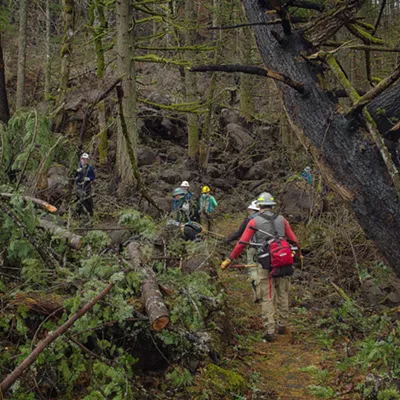
The Environmental Protection Agency is officially starting the process to list the Upper Columbia River site as a Superfund site.
In an announcement today, the EPA noted it has proposed putting the site on the National Priorities List, which includes the various projects that are eligible for federal Superfund cleanup money and increased federal oversight.
"Today’s action builds on decades of efforts to clean up the river and protect the health of
people who live, work, and recreate in and near the Upper Columbia," said EPA Region 10
Administrator Casey Sixkiller, in the March 5 announcement. "Listing this site on the National Priorities List unlocks the full suite of tools and resources of EPA’s Superfund program to address this complex site and take additional steps to protect young children from harmful levels of lead."
As we reported two weeks ago, the area between Grand Coulee Dam and the Canadian border, which includes about 150 river miles of the Columbia River, has been studied for nearly 20 years as part of a settlement agreement with Teck, a Canadian mining company.
Teck owns a smelter 10 river miles north of the border in Trail, British Columbia.
Lead and arsenic levels are higher than federal standards in some soils along the river to the south of that site, potentially putting human health at risk, according to the EPA. Lead exposure can cause irreversible intellectual impairment, particularly in children.
However, federal litigation previously found that Teck cannot be held liable for the contamination in the soil, which could have been deposited through the air.
For years, tribes and environmental groups have noted that the process to finish a remedial investigation and feasibility study promised by the 2006 settlement agreement has stalled for too long.
EPA led the process to conduct the human health assessment in the area that found there are unacceptable risks from lead. But the ecological risk assessment, which is being led by Teck and should give a better understanding of risks to the environment, is still ongoing.
"Folks have been frustrated by the lengthy process," says Bill Dunbar, a spokesman for EPA Region 10. "It's time to get moving."
While Teck voluntarily paid for some previous soil cleanup, tribes and others want to see more significant cleanup get underway, and it looks like federal money is the most likely source that can pay for that, making the Superfund listing appealing.
Politicians in the area, on the other hand, strongly oppose listing the site. The Eastern Washington Council of Governments, including members from 16 counties, asked that the EPA allow those studies to be finished before making a decision to put the site on the National Priorities List. Some question whether there's significant enough pollution in the area (fish advisories are similar to those in many other parts of the state), and say the listing could negatively impact recreation and property values.
After today's announcement, the site could get official Superfund status as soon as this September.
Preliminary documents about the proposed listing are available online. The 60-day public comment period will start after the official paperwork is filed in the federal register on Thursday, March 7, and will go through May 6.
Those who wish to comment can do so starting Thursday by searching for the official docket at regulations.gov.





















